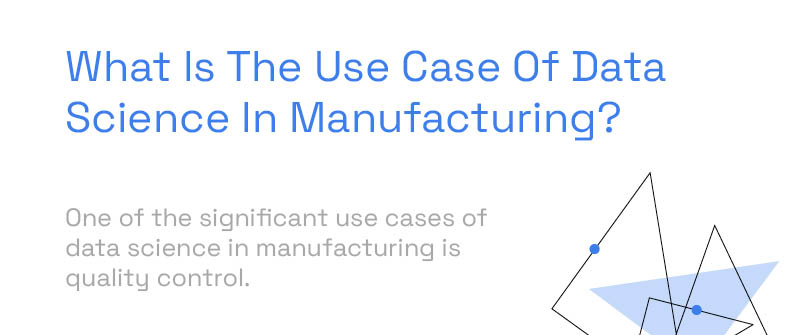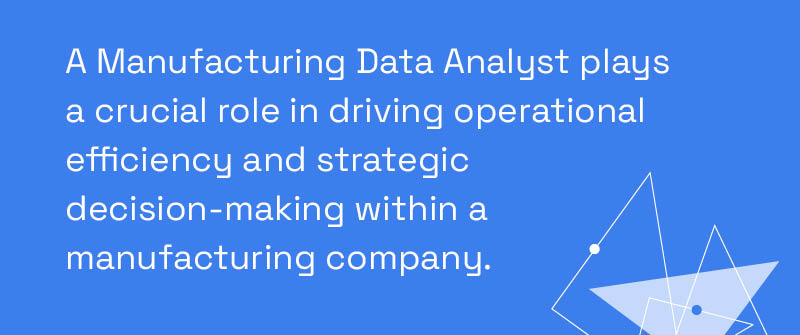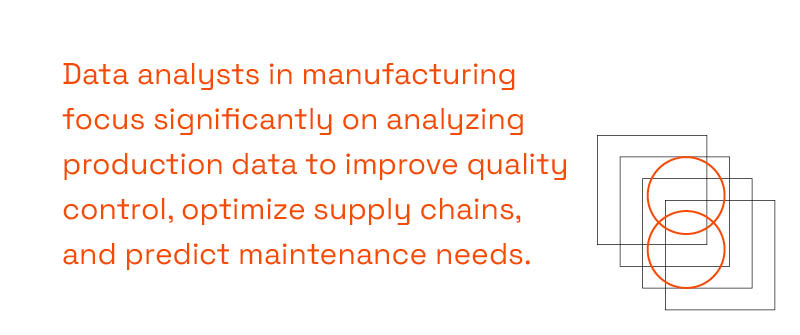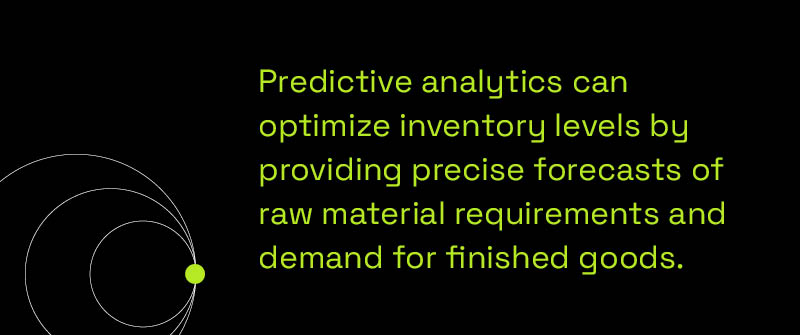
How Is Data Analytics Used In Manufacturing?
In the era of Industry 4.0, data analytics has become a cornerstone for manufacturing companies aiming to optimize efficiency, reduce costs, and improve product quality. Leveraging manufacturing data analytics allows businesses to turn vast amounts of raw data into actionable insights that drive decision-making and innovation.
Introduction to Data Analytics in Manufacturing
Manufacturing companies generate copious amounts of data through their operations, including information from machines, production lines, supply chains, and customer feedback. By employing sophisticated data analytics techniques, businesses can capture, analyze, and interpret these data points to gain a competitive edge. From predicting machine failures to optimizing production schedules, the applications are nearly limitless.

Overview of Data Types in Manufacturing
The types of data collected in manufacturing typically include sensor data, operational data, quality data, and even environmental data. Sensor data from machinery captures parameters like temperature, pressure, and runtime, providing valuable insights into equipment performance. Operational data consists of production rates, cycle times, and inventory levels, while quality data includes defect counts and compliance metrics. Collecting environmental data, such as humidity and vibration levels, can also inform decisions on production conditions.
Benefits of Data Analytics for Manufacturing Efficiency
One of the primary benefits of employing manufacturing analytics is the substantial improvement in operational efficiency. By analyzing production data, manufacturers can identify bottlenecks, reduce waste, and streamline processes. Enhanced monitoring using real-time data ensures quick responses to issues, minimizing downtime and maintaining continuous production. Furthermore, data-driven insights help in predictive maintenance, allowing firms to anticipate and address equipment malfunctions before they escalate into costly breakdowns.
In conclusion, the integration of mid-market data analytics in manufacturing is not just a trend but a necessity. It equips organizations with the tools to navigate complexities and drive continuous improvements, ultimately leading to a more agile and resilient manufacturing environment.
What Is The Use Case Of Data Science In Manufacturing?
In the ever-evolving landscape of manufacturing, data science is emerging as a pivotal tool for driving operational efficiency, reducing costs, and enhancing product quality. Leveraging manufacturing analytics, companies can delve into a rich trove of data to uncover actionable insights that fuel their strategic and tactical decisions. Let’s explore some compelling use cases where data science is making a measurable impact in the manufacturing sector.
Quality Control and Improvement
One of the significant use cases of data science in manufacturing is quality control. Traditional methods of quality inspection are often reactive, identifying issues only after they have occurred. However, by harnessing the power of manufacturing analytics, it’s possible to implement proactive quality control measures. Advanced algorithms analyze production data in real-time, identifying anomalies and predicting defects before they manifest. This shift towards a proactive quality assurance model not only reduces wastage but also enhances the overall reliability of the manufacturing process.

Predictive Maintenance
Another transformative use case is predictive maintenance. Traditional maintenance schedules are either time-based or reactive, leading to unnecessary downtime or unexpected failures. By utilizing types of data in manufacturing, such as machine performance metrics and historical maintenance logs, predictive models can forecast equipment failures before they occur. This approach ensures that maintenance activities are only carried out when necessary, thereby optimizing the utilization of resources and minimizing unplanned downtime.
Supply Chain Optimization
Data science also plays a crucial role in refining supply chain operations. From supplier performance assessments to logistics and inventory management, the applications are numerous. Advanced analytics enable manufacturers to build more resilient and efficient supply chains by predicting delays, optimizing routes, and ensuring that inventory levels meet but do not exceed demand forecasts. This level of optimization drives cost efficiencies and bolsters customer satisfaction by ensuring timely deliveries.
Production Data Analysis in Excel
In the world of manufacturing data analytics, Excel remains a widely used tool for data manipulation and visualization. While it might seem basic compared to other advanced analytics platforms, Excel’s versatility makes it invaluable. With it, manufacturing professionals can create intricate data models, visualize types of data in manufacturing, and perform deep-dive analyses without requiring extensive statistical programming knowledge. Excel serves as an accessible entry point for companies beginning their data-driven transformation, allowing them to gradually evolve their analytical capabilities.

Production Data Analysis in Power BI
While Excel is an excellent starting point for analyzing production data, Power BI takes your analytics capabilities to the next level. Power BI offers real-time data connectivity, automated reporting, and powerful visualizations that Excel can’t match. With its robust integration with the Microsoft ecosystem, including Excel itself, Power BI allows manufacturers to scale their analytics, improve decision-making speed, and reduce manual processes. By leveraging Power BI, you unlock advanced insights without sacrificing the ease of use that makes Excel so popular, making it the ideal solution for growing manufacturing organizations ready to modernize their data approach. Learn what Power BI consulting can do for your business.
What Does A Data Analyst Do In A Manufacturing Company?
Core Responsibilities of a Manufacturing Data Analyst
A Manufacturing Data Analyst plays a crucial role in driving operational efficiency and strategic decision-making within a manufacturing company. At the core, their responsibilities involve collecting, processing, and analyzing vast amounts of production data to identify trends and opportunities for improvement. They work closely with engineering and management teams to interpret data and translate it into actionable insights that can enhance production processes, reduce downtime, and increase overall productivity.

Skills Required for Manufacturing Data Analysts
To excel in Manufacturing Data Analytics jobs, professionals need a blend of technical and soft skills. Proficiency in statistical analysis software, database management, and scripting languages like Python or R is essential. Moreover, familiarity with production data analysis in Excel and the ability to create comprehensive reports is often required. Equally important are problem-solving abilities, critical thinking, and excellent communication skills to effectively convey insights to non-technical stakeholders.
Building on these skills, Power BI offers an opportunity to push your analytics further. Its ability to handle large datasets, integrate seamlessly with other Microsoft tools, and deliver insights faster makes it an invaluable asset in the manufacturing industry. As organizations increasingly rely on real-time data for decision-making, mastering Power BI not only enhances your technical toolkit but also positions you to drive greater business impact. By combining Power BI’s capabilities with your problem-solving and communication skills, you’ll be well-equipped to provide deeper insights and deliver results that stand out to stakeholders.
Analyzing Production Data
Data analysts in manufacturing focus significantly on analyzing production data to improve quality control, optimize supply chains, and predict maintenance needs. This involves using advanced analytical techniques and tools to monitor performance metrics, identify inefficiencies, and recommend data-driven solutions. By scrutinizing production data, they help pinpoint the root causes of bottlenecks and suggest optimizations that can lead to significant cost savings.

Reporting and Decision-Making
Generating clear and actionable reports is a critical duty of a manufacturing data analyst. They must be adept at visualizing data through dashboards and presentations that make complex data accessible and understandable for decision-makers. This supports the strategic goals of the company by ensuring that decisions are supported by empirical evidence and thorough analysis.
Understanding Manufacturing Data Analyst Salary
The role of a Manufacturing Data Analyst is highly valued, and as such, the compensation reflects the significance of their contributions. Salaries can vary based on experience, location, and the specific demands of the role, but generally, it is a well-compensated position. Staying updated with the latest trends and continuously advancing one’s skill set can further enhance earning potential and career growth within the field.
What Is Predictive Analytics Use Case In Manufacturing?
Predictive analytics has become a game-changer in the manufacturing industry, providing robust solutions to enhance operational efficiency and decision-making. At its core, it leverages historical data, algorithms, and machine-learning techniques to forecast future events and trends. This proactive approach empowers manufacturers to anticipate issues and capitalize on opportunities, significantly reducing downtime and optimizing performance.
Predictive Maintenance
One of the most significant applications of predictive analytics in manufacturing is predictive maintenance. Traditionally, maintenance was performed either on a fixed schedule or after a failure had already caused disruptions. In contrast, predictive maintenance predicts equipment failures before they occur, allowing for timely interventions. This process minimizes downtime, extends the lifespan of machinery, and reduces maintenance costs, ensuring uninterrupted production.
Demand Forecasting
Demand forecasting is another critical area where predictive analytics brings immense value. By analyzing historical sales data, trends, and market dynamics, businesses can predict future product demand with high accuracy. This foresight enables manufacturers to adjust production schedules, manage inventory levels effectively, and allocate resources efficiently, thereby meeting market demands without overproduction or stockouts.
Inventory Management
Efficient inventory management is vital to the success of any manufacturing operation. Predictive analytics can optimize inventory levels by providing precise forecasts of raw material requirements and demand for finished goods. This technique reduces the likelihood of excess inventory, lowers storage costs, and ensures that critical materials are always available for production, enhancing the overall supply chain efficiency.

The Power of Data Analytics in Modern Manufacturing
Data analytics is revolutionizing the manufacturing industry by providing actionable insights that optimize efficiency, reduce costs, and enhance product quality. From quality control to predictive maintenance and supply chain optimization, data science is transforming traditional operations. While Excel remains a useful tool for entry-level analysis, platforms like Power BI offer advanced capabilities, including real-time data connectivity and automated reporting, allowing manufacturers to scale their analytics and improve decision-making. As the role of data analytics continues to expand, mastering tools like Power BI is essential for driving business impact and staying competitive in today’s manufacturing landscape.
Embrace the transformative power of predictive analytics with P3 Adaptive. Our customized solutions and expert consultants will turn your complex data into actionable insights, empowering you to make quick and confident strategic decisions. Seize the opportunity to revolutionize your manufacturing processes today! Contact P3 Adaptive now!
Get in touch with a P3 team member